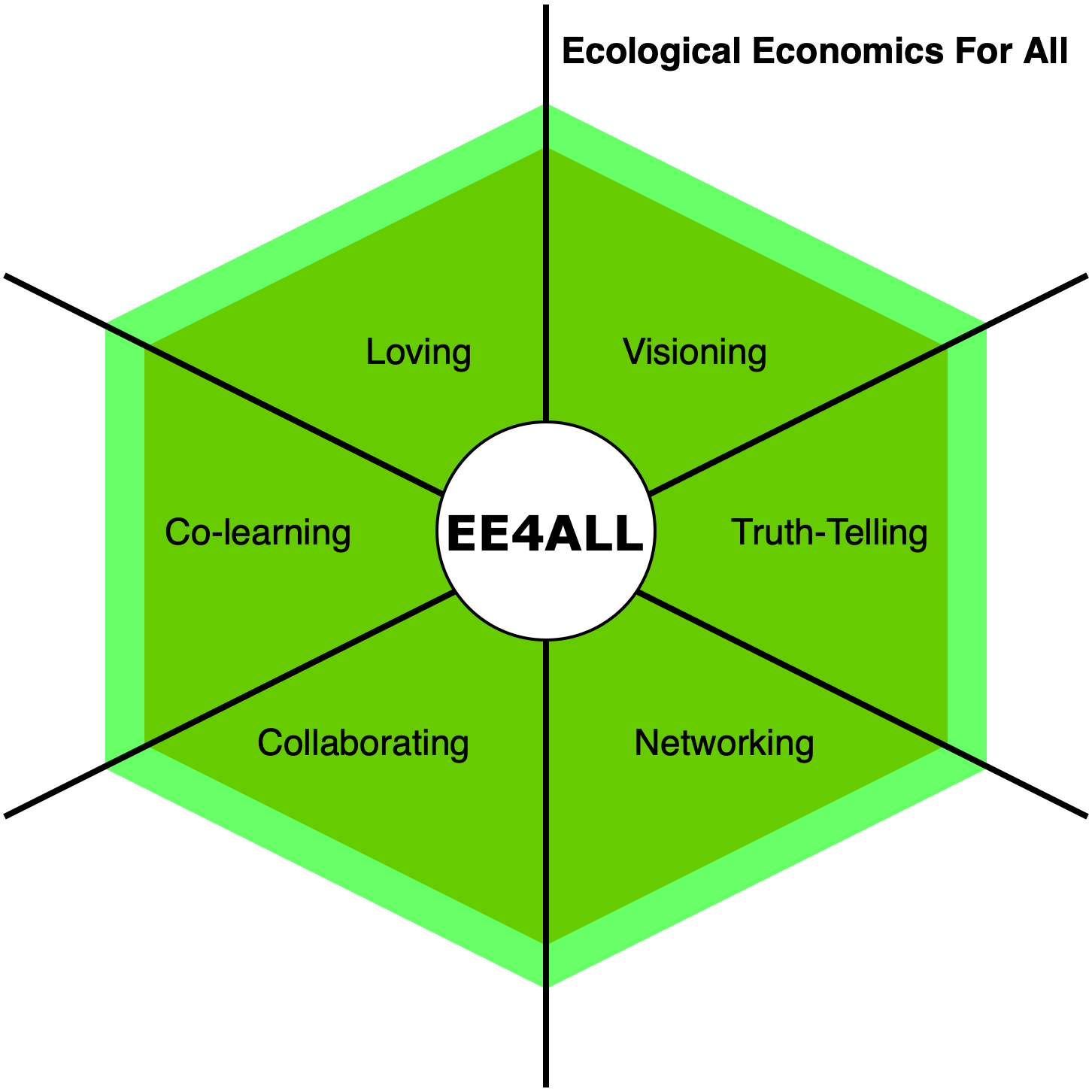
About Ecological Economics For All
Who we are
The idea of Ecological Economics for All (EE4ALL) began to take shape at the beginning of the Covid-19 pandemic around the 50th anniversary of Earth Day in 2020 under the leadership of graduate students and faculty researching ecological economics at the Gund Institute for Environment at the University of Vermont (UVM). The EE4All Initiative draws inspiration from the Leadership for the Ecozoic’s vision of reimagining higher education to enable a future founded on mutually enhancing relationships among humans and the rest of nature. EE4ALL is also heavily inspired by the Rethinking Economics movement, and is now working collaboratively and aligned as a project of the new chapter of Rethinking Economics UVM established in 2022 by leaders of EE4ALL.
The EE4ALL Initiative aims to overcome institutional barriers of information sharing in higher education to create an open-access global virtual center for rethinking and ecologizing economic thinking to promote well-being within planetary boundaries. Our goal is to make readily available the knowledge base of ecological economics to help us to think about how we might address address the social inequalities and ecological crises of our planet. Since the 1950’s, these crises have been driven in great part by misplaced economic goals to grow GDP for the sake of growth and to use this as a poor proxy for well-being. The Covid-19 pandemic uncovered the extreme social inequality and environmental unsustainability at the root of our socio-economic systems today, which presents a unique opportunity to reimagine and transform our economy and society to achieve wellbeing and sustainable prosperity for all.
Since its foundation in 1989, Ecological Economics became one of the first transdisciplinary fields of its kind by taking on an ambitious vision to develop a socio-ecological paradigm shift in economic thinking where wellbeing within planetary boundaries is prioritized. The EE4ALL initiative builds on the shoulders of giants such as Georgescu-Roegen, Howard Odum, Herman Daly, Mari-Ann Jansson, Robert Costanza, Martinez-Alier, Donella Meadows, Elinor Ostrom, John Gowdy, Lisi Krall, Charles Hall, Inge Røpke, among many others, who helped to develop the biophysical and social foundation of ecological economics. Ecological economists come from all walks of life but are ultimately united by an ethic of care for nature, justice, and time.
In EE4ALL, we believe that anyone who cares about working to achieve real sustainability can and should call themselves ecological economists. In this decade of action, the knowledge created by people involved in ecological economics and allied heterodox economics schools needs the serious attention of everyone interested in rethinking economics and finding leverage points in our broken systems to improve our quality of life while restoring and enhancing the ecological foundation of all life.
Our Mission
The mission of EE4ALL is to make readily available the theory and knowledge of ecological economics and allied heterodox economic fields to everyone who wishes to use it to promote local, regional, national and global economic transformations that foster genuine and inclusive well-being through ecologically sustainable and equitable societies. EE4ALL aims to achieve its mission by facilitating educational, collaborative, and policy initiatives that bring people together to advance well-being for all.
Our EE4ALL logo illustrates how our mission is based on implementing Donella Meadows’ tools for the transition to sustainability within the hexagon symbol used by Howard Odum to represent sustainable communities. Donella Meadows called for visioning first what do we want our initiatives to accomplish, and then building from there to achieve our goals by telling the truth, networking, learning, and loving. We have adapted her tools and added collaborating and co-learning to emphasize tools that can help us achieve our mission.
Our Logo: The meaning of the hexagon that makes up the logo of EE4ALL is based on the symbol for consumers and sustainable communities that systems ecologist and ecological economics pioneer Howard Odum used in his system thinking language. Within the hexagon are the tools for the transition to sustainability, adapted form Donella Meadows, that drive our mission.
Why a Hexagon? Hexagons are found everywhere in nature as they form the building blocks of life from DNA to snowflakes to honeycombs. For example, the hexagon is the shape that hydrogen molecules take when they freeze to form snowflakes; bees structure their honeycombs with hexagons to maximize efficiency; and hexagons also serve as the structure of nitrogenous bases that combine to form the double-helix structure of DNA.
Partners
We cannot do this work alone. This is why we work collaboratively with the Leadership for the Ecozoic Project, Rethinking Economics UVM, The Gund Institute for Environment, International Society for Ecological Economics, US Society for Ecological Economics, The Donella Meadows Project, Earth4All, Democracy Collaborative, Economists for Future, Doughnut Economics Action Lab, and any future partners of the network who want to rethink economics for people and planet.
